What Do I Do If My House Smells Like Gas

What To Do If Your House Smells Like Gas: A Comprehensive Guide
The smell of gas in your home is a serious issue that demands immediate attention. Natural gas and propane are intentionally odorized with a sulfur-like scent (often described as rotten eggs) to make leaks detectable. This early warning system is crucial for preventing potentially catastrophic events like explosions and carbon monoxide poisoning. This guide provides a step-by-step approach to safely address a gas leak, minimize risks, and understand the potential causes.
Immediate Actions: Safety First
Your priority is to ensure the safety of yourself and your family. Act swiftly and decisively.
- Evacuate Immediately: If you smell gas, don't hesitate. Get everyone out of the house as quickly and calmly as possible. Don't waste time trying to find the source of the leak.
- Don't Use Electrical Devices: Any electrical device, including lights, cell phones, and appliances, can create a spark that ignites the gas. Leave everything as it is and avoid turning anything on or off. Even flipping a light switch can be dangerous.
- Don't Light Anything: This includes candles, cigarettes, or matches. Any open flame is a potential ignition source.
- Leave Doors and Windows Open (If Safe): If you can do so safely while exiting, open doors and windows to ventilate the house. This will help dissipate the gas. However, don't delay evacuation to do this.
- Call the Gas Company or Emergency Services from Outside: Once you are a safe distance from the house, call your gas company or 911. Use a neighbor's phone or your cell phone away from the affected area. Follow their instructions carefully.
- Don't Re-enter the House: Do not return to the house until the gas company or emergency responders have deemed it safe. They will need to inspect the property and locate the source of the leak.
Identifying the Source of the Gas Smell
While it's crucial to evacuate first, knowing where the gas smell originates can help the gas company pinpoint the problem quickly. Common sources include:
- Gas Appliances: Furnaces, water heaters, stoves, and dryers are all potential sources. Check around these appliances for a strong gas odor.
- Gas Lines: Inspect visible gas lines entering your house and connecting to appliances. Look for signs of damage or corrosion.
- Pilot Lights: A blown-out pilot light on a gas appliance can release unburned gas.
- Outdoor Gas Meter: If the smell is strong outside near your gas meter, the leak might be from the meter itself or the underground gas line.
- Sewer Lines: In rare cases, sewer gas (which can contain methane) can leak into your home, mimicking a gas leak. This is usually accompanied by other unpleasant odors.
Important Note: Never attempt to repair a gas leak yourself. Always rely on qualified professionals.
Potential Causes of Gas Leaks
Understanding the potential causes of gas leaks can help you prevent them in the future.
- Corrosion: Over time, gas pipes can corrode, leading to leaks. Older homes are particularly susceptible.
- Loose Connections: Gas line connections can loosen due to vibrations or temperature changes.
- Damaged Appliances: Faulty gas appliances can leak gas even when they are turned off.
- Accidental Damage: Digging or construction work near gas lines can cause damage and leaks.
- Earthquakes or Ground Movement: Seismic activity can damage underground gas lines.
Preventative Measures: Maintaining Your Gas System
Regular maintenance is essential to prevent gas leaks and ensure the safe operation of your gas system.
- Annual Inspections: Have a qualified HVAC technician or gas company representative inspect your gas appliances and gas lines annually.
- Carbon Monoxide Detectors: Install carbon monoxide detectors on every level of your home and test them regularly. Carbon monoxide is a colorless, odorless gas that can be deadly.
- Gas Leak Detectors: Consider installing gas leak detectors, especially near gas appliances. These detectors will sound an alarm if they detect a gas leak.
- Proper Ventilation: Ensure proper ventilation for gas appliances to prevent the buildup of carbon monoxide.
- Professional Repairs: Always hire qualified professionals for gas appliance repairs and gas line work.
- Be Aware of Construction: If you are planning any digging or construction work on your property, call your local utility company to locate underground gas lines before you start.
Understanding Gas Appliance Safety
Gas appliances offer efficiency and convenience, but it's crucial to use them safely.
- Read the Manufacturer's Instructions: Always read and follow the manufacturer's instructions for operating your gas appliances.
- Never Use Gas Appliances for Heating: Never use a gas stove or oven to heat your home. This can lead to carbon monoxide poisoning.
- Clean Gas Appliances Regularly: Keep gas appliances clean and free of debris to ensure proper operation.
- Replace Old Appliances: Replace old or malfunctioning gas appliances with new, energy-efficient models. Modern appliances often have safety features that older models lack.
Emergency Contacts
Keep these important phone numbers readily available:
- Gas Company: Your local gas company's emergency number.
- 911: For immediate emergency assistance.
- HVAC Technician: A trusted HVAC technician for gas appliance repairs.
The Role of HVAC Systems in Gas Safety
Your HVAC system, particularly your furnace, is a critical component of your home's gas system. Regular maintenance is vital.
- Furnace Inspections: Ensure your furnace is inspected annually by a qualified technician. They will check for gas leaks, carbon monoxide leaks, and proper venting.
- Flue Inspection: The flue is the pipe that vents exhaust gases from your furnace to the outside. A blocked or damaged flue can cause carbon monoxide to build up in your home.
- Combustion Efficiency: A properly tuned furnace operates with optimal combustion efficiency, minimizing the risk of carbon monoxide production.
Upgrading to a New, Safer HVAC System
If your existing HVAC system is old or unreliable, consider upgrading to a new, more efficient model. Newer furnaces often come with advanced safety features, such as:
- Flame Rollout Sensors: These sensors detect if the flame is rolling out of the burner chamber and shut off the gas supply to prevent a fire.
- Overheat Sensors: These sensors detect if the furnace is overheating and shut it down to prevent damage.
- Automatic Shut-Off Valves: These valves automatically shut off the gas supply in the event of a power outage or other malfunction.
When choosing a new furnace, consider the AFUE (Annual Fuel Utilization Efficiency) rating. A higher AFUE rating indicates a more efficient furnace, which can save you money on your energy bills. Popular brands include Carrier, Trane, and Lennox, all known for their reliability and efficiency. Look for models with smart home integration and advanced diagnostic features for added safety and convenience.
Warranty Considerations: Always review the warranty offered by the manufacturer and installer. A comprehensive warranty can provide peace of mind and protect you from unexpected repair costs.
By following these steps and taking preventative measures, you can protect yourself and your family from the dangers of gas leaks. Remember, safety should always be your top priority.










